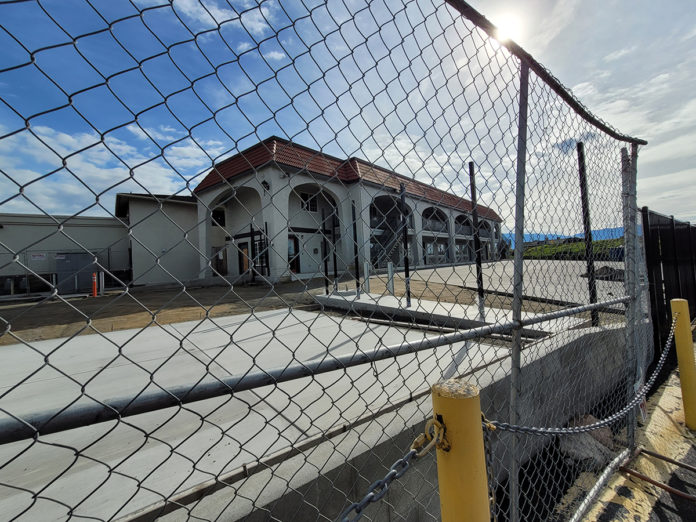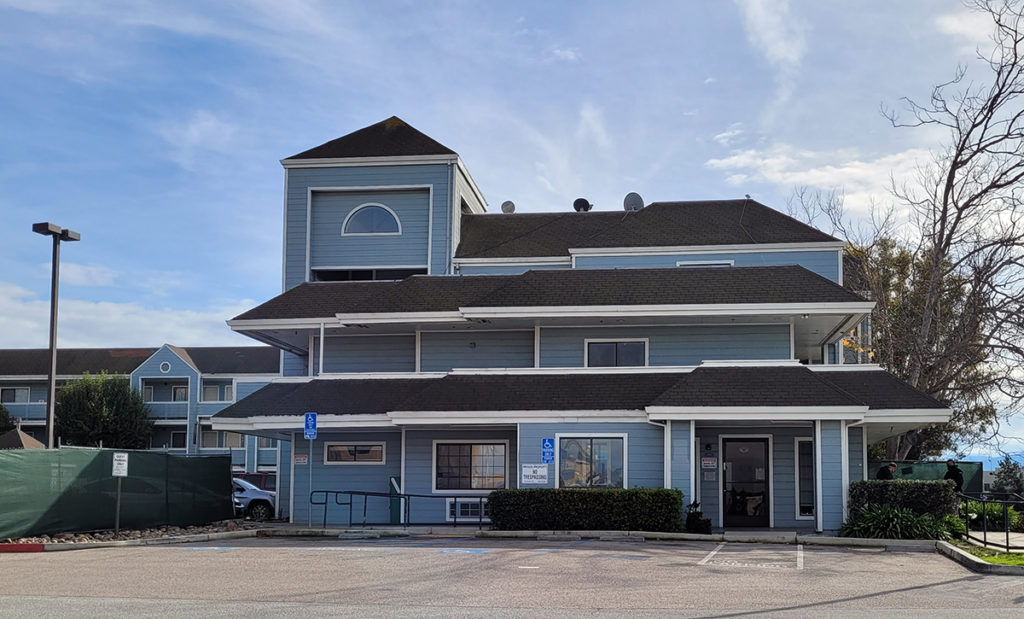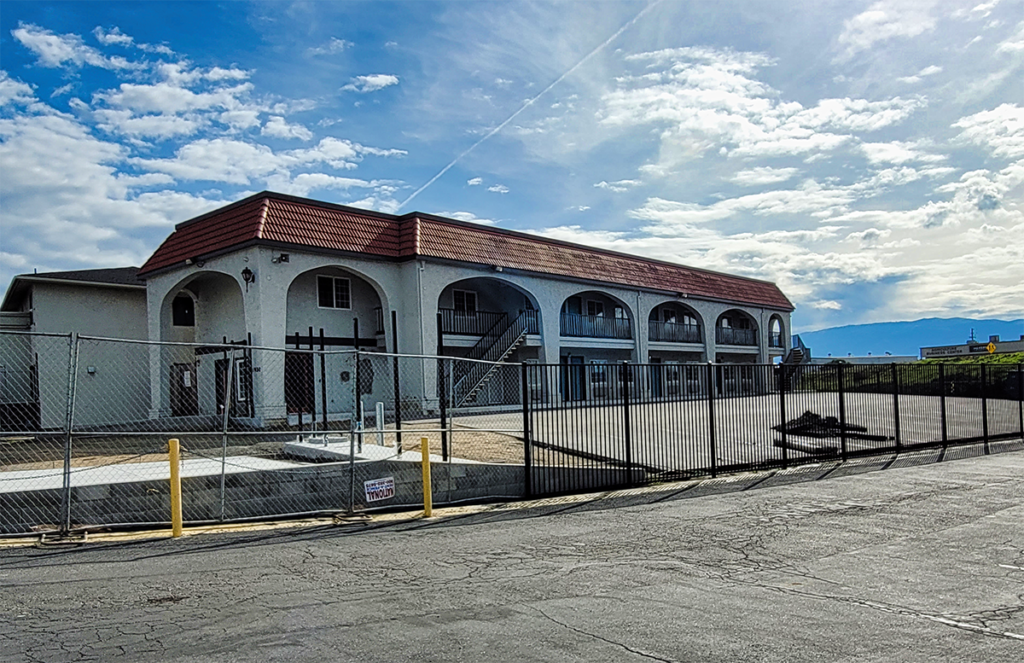
SALINAS — California Attorney General Rob Bonta filed a lawsuit last week against the developer of Salinas’ troubled Step Up Project Homekey motel conversions, and the City of Salinas is named as a defendant.
The projects at the 45-unit former Sanborn Inn at 180 S. Sanborn Road, the 59-unit former Salinas Inn at 1030 Fairview Ave. and the 101-unit former Good Nite Inn at 545 Work St. in Salinas were intended to create more than 200 living units for the city’s unhoused.
Bonta’s lawsuit is just the tip of the iceberg. The case involves a pandemic-era emergency housing program, $20 million in missing funds, donations to California Gov. Gavin Newsom and a development firm founded by actor Elizabeth Hurley’s baby daddy, who killed himself in 2020. The firm still claims former President Bill Clinton as a strategic advisor in executive bios posted to the web.
According to documents reviewed by the Salinas Valley Tribune, entities associated with Los Angeles-based, politically-connected Shangri-La Industries and Shangri-La Construction took $114 million in grants from the State of California, ostensibly to purchase and refurbish hotel properties in Central and Southern California. Once it secured titles to the properties, it illegally took out $54.7 million in loans and encumbered the properties with lenders’ deeds of trusts, according to allegations lodged by state housing officials.
Lawsuits now contend that the Delaware-registered firms borrowed funds and accepted public monies but didn’t pay its vendors, complete the projects or apply rents to pay its loans.
They skipped property taxes too. The Monterey County tax collector’s online portal displays bills that indicate the county will be owed $174,081 as of April 10 on two Salinas parcels. The third is untaxed because of a charitable exemption.

The AG’s suit, filed on behalf of the state’s Department of Housing and Community Development, asks for the return of Shangri-La’s Homekey money as well as for court orders to block bank foreclosure proceedings and to secure the properties for affordable housing. California gave Salinas and Shangri-La $36.5 million to convert the three hotels into permanent housing for homeless residents.
On Dec. 22, 2022, Shangri-La moved $10 million from the project to its CEO’s credit union account.
In addition to the Salinas projects, Shangri-La reportedly defaulted on projects in King City, Redlands, Thousand Oaks and elsewhere in California. The hotel conversions were announced during the pandemic’s early days by Gov. Newsom as a fast track solution to providing permanent housing for unhoused individuals. Homekey has been touted as a signature initiative to put roofs over the heads of people who would otherwise sleep along roads, doorways and creek beds.
Shangri-La secured a total of $114 million in Project Homekey grants for seven projects in San Bernardino, Ventura and Monterey counties. The projects were intended to create 500 permanent housing units.
Instead of easing homelessness, the failed developer is being accused of operating a “Ponzi scheme” by one of its lenders, according to a reported Dec. 8 court filing, an allegation disputed by the firm’s CEO in a Dec. 18 report by Los Angeles public radio station KCRW.
“In effect, Shangri-La is operating a real estate Ponzi scheme, where loans that were supposed to be reserved to complete specific projects were commingled with other funds and entities to prop-up other failing Shangri-La projects,” reads a Dec. 8 court filing quoted by Santa Monica public radio station KCRW.
“I’m not going to respond to that allegation at all,” Shangri-La owner and CEO Andy Meyers told KCRW. “We are an entity, Shangri-La Industries, and have a number of properties. But there’s no Ponzi scheme. Obviously, whomever made such an accusation doesn’t know what a Ponzi scheme is.”

According to the Los Angeles Times, Shangri-La took out loans against Project Homekey properties without state approval or incorporating the affordability restrictions.
A suit by BMO bank alleges that “In December 2022, Borrowers, without Lender’s consent, transferred nearly $9 million in Lender’s cash collateral out of the Borrowers’ BMO Accounts.” The legal filing contains copies of the Ventura Credit Union account in the name of Andrew Abdul-Wahab, an alias of Meyers, with a $7 million balance. BMO says at least $10 million in project funds that were part of BMO’s collateral were wired to the credit union account, out of reach of the secured lender should it try to collect on the defaulting loan.
BMO’s suit also says Shangri-La provided an inaccurate balance sheet, neglecting to include the nearly $20 million line of credit as a liability and the $20 million it had on deposit at a credit union as an asset. The credit line lists the Salinas Project Homekey site at 180 Sanborn Road as collateral.
Another Monterey County Superior Court suit filed by a Medalist Partners Asset-Based Private Credit Fund seeks damages from 1130 Broadway Street LP, which matches the address of the King City motel conversion project.
Shangri-La is also being sued by its contractors. On Dec. 28, Master Guard Security filed suit in Monterey County Superior Court alleging $28,594 in unpaid services on Shangri-La’s Salinas project. Northstar Development filed suit on Dec. 4 for unpaid bills of nearly $1.9 million on the project at 1030 Fairview Ave. in Salinas, which is currently in receivership.
The firm was started by wealthy entertainment industry investor Steve Bing, a large Democratic donor who gave at least $50 million to candidates and ballot measures over a 20-year period. The grandson of the Manhattan real estate developer Leo Bing, he inherited a $600 million fortune at age 18. Recipients of Bing’s largesse included Gov. Newsom, U.S. Secretary of Health and Human Services Xavier Becerra and U.S. Sen. Alex Padilla.
According to Forbes magazine, ex-President Clinton was paid $2.5 million in consulting fees by Shangri-La Industries in 2009 and 2010.
On June 22, 2020, the 55-year-old Bing jumped to his death from the 27th floor of a luxury highrise apartment building in Los Angeles’ Century City district. Town and Country magazine reported that Bing had only $300,000 in liquid assets at the time of his death.
According to a lawsuit filed against Meyers by Bing’s daughter, Kira Korkorian, Bing sold Shangri-La Construction in 2017 to Myers, but he failed to pay Bing the promised amounts. Meyers’ bio says he once played professional football for the Buffalo Bills and pledged a $1 million donation to UCLA’s football program.

Shangri-La’s nonprofit partner in the housing ventures is the tightly linked Step Up on Second Street, Inc. Step Up established individual LLCs for the projects, with attorney Judson Leibee named as contact. According to his LinkedIn resume, Leibee was Shangri-La Construction’s chief financial officer for seven years, until September 2016. A year later he became Step Up’s CFO, a position he held for almost six years, leaving in September 2023, when Shangri-La’s deals started to unravel.
In King City, where Shangri-La was slated to rehabilitate the motel to house individuals living near the Salinas River, the city has taken temporary measures. Those affected are being housed in an alternative location until at least June, according to King City Mayor Mike LeBarre.
“We have been proactive to ensure our project continues to move forward,” LeBarre said. “We are fortunate to have such great partners to help us find the funding to keep our homeless residents housed until this matter is resolved.”
Salinas Mayor Kimbley Craig stated that the impacted cities are uniting to preserve the Homekey projects and shield themselves from Shangri-La’s defaults.
Meanwhile, weeds and garbage choke the former Days Inn parking lot near the Highway 101 Broadway exit, suggesting that it’s been a long time since any renovation activity has ensued at the King City project site, and uncovered damage from a removed porte-cochère at the entrance exposes wood structural elements to winter rains.
Additional reporting by Ryan Cronk.













